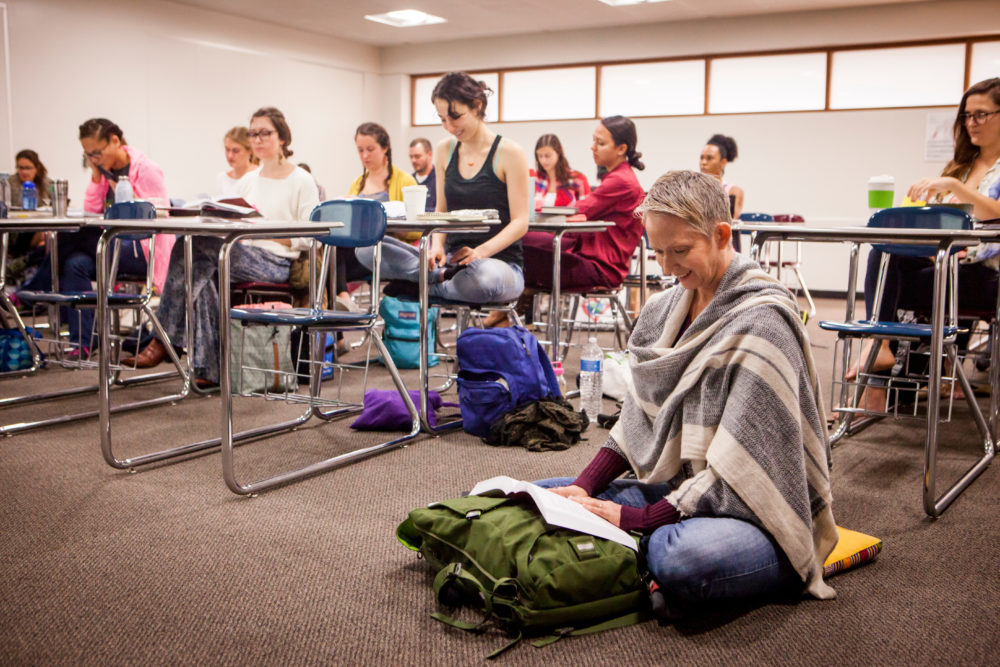
In 2013, the Yoga Studies program at Loyola Marymount University offered the first master’s degree of its kind in the United States. The innovative program’s offerings continue to expand and in 2019 it will launch a low-residency option, allowing students to earn a M.A. in Yoga Studies from anywhere in three years.
Students in the low-residency cohort will spend 10 days at LMU during the first summer of their program meeting faculty and their peers, participating in research and writing workshops, familiarizing themselves with various learning platforms, and visiting historic and modern Yoga sites in Los Angeles. During the second residency, they will join the residential cohort for a three-week immersive experience in India studying Jain Yoga. Students return to LMU for their final residency in the third summer to complete a comprehensive exam and prepare for their final research project.
With the low-residency M.A. option, 85 percent of the coursework can be completed remotely. Students will utilize instructional technology to stream into the LMU classroom, where they can engage with on-campus faculty and peers. All lectures will be archived and accessible online throughout the duration of the semester. In addition to benefiting from the social and shared learning aspect of attending live lectures, the low-residency cohort will also have access to discussion groups, voice threads, student generated videos, digital library resources, and scheduled chat time with faculty and teaching assistants.
“Students will be an active part of the cohort community with peers near and far, and will have strong faculty advisement,” says Sarah Herrington, program administrator for Yoga Studies at LMU.
The program is intended for anyone interested in the practice and scholarship of Yoga who cannot make the commitment to move to Los Angeles, or drastically change their lifestyle.
“Some students already have well-established work in the Yoga field in their hometown,” says Christopher Key Chapple, Doshi Professor of Indic and Comparative Theology and founding director of Yoga Studies at LMU. “This new model allows them to continue their studies while maintaining and enriching their teaching and practice of Yoga at home.”
Yoga is now practiced by more than 30 million Americans and there is a growing demand for advanced courses of study, which offer a deeper understanding of the tradition. LMU’s program is evolving to meet the needs of yogis with residential and low-residency M.A. options, health sciences and philosophy/theology tracks, as well as a post-graduate Yoga therapy certificate.
“The academic study of Yoga is important since the practice of Yoga has grown so much. As Yoga expands in the West, it’s important for teachers and others in the field to fully understand the various roots of Yoga and lenses to its understanding. That way, students are sharing with context, integrity, and a full appreciation for the various paths of Yoga,” says Chapple.
LMU’s Yoga Studies curriculum is designed to help students explore Yoga’s rich history, its relationship to religion and spirituality, and Yogic philosophy. Students study primary classical texts, learn the Sanskrit language, explore the health benefits of physical practice, and look at the placement of Yoga in today’s world. Social outreach is another component of the program with students venturing out into the community to share Yoga in prisons, homeless shelters, community centers, recovery centers, and local schools.
Graduates of the program are contributing significantly to the understanding of Yoga through various pathways. Some are pursuing Ph.D.’s in related fields and publishing their research, while others are practicing Yoga therapists, teaching at other colleges and universities, and overseeing curriculum development at online streaming Yoga media companies. Many are operating Yoga studios and collaborating with non-profit programs to bring Yoga into schools and recovery programs. A group of alumni is even involved in the development of programs for veterans and service members through direct work with the U.S. Navy and Veterans Yoga Project.
Yoga is proven to be an effective healing modality, and people experience profound physical and psychological benefits from the integration of theory and practice. Yoga Studies at LMU is committed to enriching the field through holistic programs encompassing physical movement, philosophical speculation, meditation practice, as well as theological and religious perspective.
“I think the evolution of this program highlights something wonderful about the M.A.; we are interested in honoring both the history and roots of Yoga, and its future – where it’s all going,” says Herrington.



